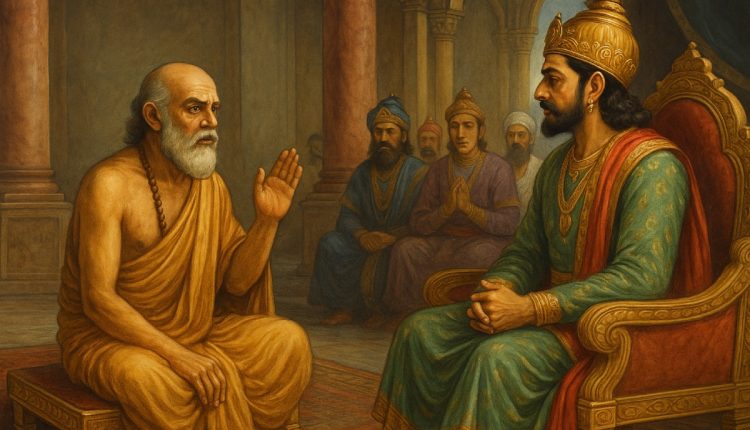Vidura Niti, amid stories of bravery and intrigue in Mahabaratha speaks directly on the core of leadership. Vidura’s advice feels not only pertinent but also urgent as we struggle with the intricacies of contemporary leadership, where moral failings, corruption, and short sightednessfrequently make headlines. His values, which are based on dharma, truth, and the well-being of the populace, call on today’s leaders to put the interests of the people before their own and lead with honour.
In Udyoga Parva, Chapter 33, Shloka 40, the verse
“Na tathā sukhayatyarthe yathā satyam sukhāya vai,
Satyam eva param dharmam tasmāt satyam na samtyajet”
“Truth brings more happiness than wealth.” Since truth is the highest dharma, one should never give up on it”.
According to Vidura, the foundation of governance is truth, which also serves as a force for justice, trust, and long-term stability. A leader leaves a legacy that endures beyond ephemeral wealth or power when they uphold the truth, even when it is uncomfortable.
Vidura has a profound yet practical vision for leadership. He exhorts leaders to base their power on justice so that everyone is held accountable, regardless of position. He maintains that a leader must control their own desires because unbridled passions impair judgement and undermine governance. Vidura promotes humility by telling leaders to consult the wise and keep an open mind. Above all, he puts the people at the centre of leadership, judging a leader’s effectiveness by the wealth and contentment of their people. Vidura stress on foresight. Vidura cautions against choices that compromise stability over the long run in favour of short-term benefits. These ideas combine to form a leadership philosophy that strikes a balance amongst authority, responsibility, compassion and power.
How do we put this wisdom in practice ? Think about making moral decisions. A public servant who is tempted to break the law for a party of power may decide to follow Vidura’s advice and put justice before favour. In Corporate world, transparency in Vidura’s Term ” the truth in action”, has the power to change a company’s culture in the business sector.
Employees and stakeholders alike are loyal to a CEO who confronts issues head-on rather than avoiding them. Vidura’s focus on consultation provides a solution for times of conflict; leaders can establish open forums or advisory bodies to hear different viewpoints, promoting inclusivity over authoritarianism. His vision motivates sustainable policies; consider environmental laws that put the future of the planet ahead of short-term financial gain. Additionally, Vidura advocates people-centric philosophy requiring that leaders create policies that improve the lives of the underprivileged, not just the elite,
Vidura’s lessons are still remarkably relevant in 2025. From corporate wrongdoing to political backroom deals, corruption keeps undermining public trust. The remedy for Vidura’s insistence on justice and truth is open systems, impartial supervision, and leaders who live up to their words. Ethical leadership is now required in business, not just a luxury. Businesses that support sustainability or fair trade are examples of those that support Vidura’s argument that long-term well-being should take precedence over immediate profit. Vidura’s humility and consultation offer a way to bring people together in a divided world where social and political divisions are widening. Leaders can close gaps and restore trust by interacting with opponents as well as alliesalike.
Vidura’s Teachings can be applied to mitigate Global Crises like pandemics, climate change, and economic inequality. Leaders are urged to take proactive measures. His people-first philosophy calls for laws that benefit everyone, not just the wealthy and powerful. His ideas advocate collaboration over rivalry on a global scale, a common dedication to the future of humanity.
The verse about truth speaks directly to the misinformation that permeates our day and age. Leaders who maintain transparency stand out in a world full of propaganda and fake news. Truth enhances credibility, whether a CEO is handling a scandal or a president is handling a crisis. Every leader navigating today’s doubtful publics should take note of Vidura’s wisdom, which reminds us that trust is difficult to restore once it has been damaged.
However, there are difficulties also exist in putting Vidura Niti into practice. Today’s leaders frequently prioritise expediency over morality. Party loyalty may be prioritised over loyalty totruth in political systems. Corporate incentives may put the interests of shareholders ahead of the general welfare. Global issues necessitate cooperation, but conflicting interests frequently impede development. In such a setting, Vidura’s goals might seem ambitious, but they are not insurmountable. His vision can be realised through small steps, such as inclusive governance, ethical corporate policies, and anti-corruption initiatives. Vidura Niti demands intent rather than perfection.
Vidura Niti could act as a guide as we find ourselves at the intersection of crisis and opportunity. It pushes leaders to lead for the long-term benefit of their people, not for attention or financial gain. The verse about truth is a clear call. Vidura’s values can motivate leaders to behave honourably, wisely, and compassionately in both boardrooms and legislatures. His insight, speaks to our contemporary issues and exhorts us to create societies that are fair, strong, and compassionate. Let’s follow Vidura’s advice as a roadmap for a better future rather than as a holdover from the past.
Vidura Niti reminds us that true leadership creates legacies of truth rather than empires of wealth in a world that is obsessed with short-term gains.


Comments are closed.